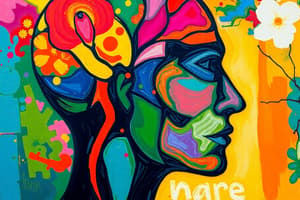Podcast
Questions and Answers
What does the term 'self' refer to in the context of identity?
What does the term 'self' refer to in the context of identity?
- The person that someone projects to others
- The entire person known only to oneself (correct)
- The roles played in various social situations
- The traits and characteristics acquired from others
Which of the following best describes the role of family in shaping identity?
Which of the following best describes the role of family in shaping identity?
- Family provides both biological and behavioral characteristics (correct)
- Family only influences biological attributes
- Family is irrelevant to personality development
- Family solely dictates future aspirations
What does the 'I' concept refer to in the context of self-understanding?
What does the 'I' concept refer to in the context of self-understanding?
- A collection of societal roles and norms
- A reflection of societal expectations
- The social image one displays
- An individual's understanding of their own emotions (correct)
How does the nurture aspect contribute to the concept of the self?
How does the nurture aspect contribute to the concept of the self?
What components make up one's identity according to the provided content?
What components make up one's identity according to the provided content?
How can identity be understood concerning time?
How can identity be understood concerning time?
Which of the following best describes the 'ME' concept?
Which of the following best describes the 'ME' concept?
What role do social institutions play in shaping the self?
What role do social institutions play in shaping the self?
What does 'character and traits integration' refer to in identity formation?
What does 'character and traits integration' refer to in identity formation?
What insight can be derived from examining the 'I' and 'ME' concepts together?
What insight can be derived from examining the 'I' and 'ME' concepts together?
What is meant by the concept of 'nursery of human nature'?
What is meant by the concept of 'nursery of human nature'?
What aspect of self-concept do identities contribute to?
What aspect of self-concept do identities contribute to?
Which of the following factors is considered a natural basis for the self?
Which of the following factors is considered a natural basis for the self?
What is one of the expected learning outcomes of this course module?
What is one of the expected learning outcomes of this course module?
Which of the following factors is not explicitly mentioned in the context of identity formation?
Which of the following factors is not explicitly mentioned in the context of identity formation?
Which statement best reflects the nature vs. nurture debate regarding the self?
Which statement best reflects the nature vs. nurture debate regarding the self?
What does Immanuel Kant believe is the foundation of knowledge?
What does Immanuel Kant believe is the foundation of knowledge?
According to Gilbert Ryle, how should we define the 'self'?
According to Gilbert Ryle, how should we define the 'self'?
What aspect of self does Maurice Merleau-Ponty emphasize?
What aspect of self does Maurice Merleau-Ponty emphasize?
What philosophical stance does Paul Churchland hold regarding the nature of the self?
What philosophical stance does Paul Churchland hold regarding the nature of the self?
Which of the following reflects Ryle's duality approach to understanding self?
Which of the following reflects Ryle's duality approach to understanding self?
How does Kant view the role of the self in relation to experiences?
How does Kant view the role of the self in relation to experiences?
What is a key component of the lived experience as described by Merleau-Ponty?
What is a key component of the lived experience as described by Merleau-Ponty?
Which philosopher suggested that the mind does not exist and the self comes from behavior?
Which philosopher suggested that the mind does not exist and the self comes from behavior?
At what stage do children begin to mimic or imitate others as part of their self-development?
At what stage do children begin to mimic or imitate others as part of their self-development?
Which concept explains that one's sense of self is derived from how we believe others perceive us?
Which concept explains that one's sense of self is derived from how we believe others perceive us?
Which stage involves children taking on the roles of particular or significant others?
Which stage involves children taking on the roles of particular or significant others?
What is the 'generalized other' in the context of self-development?
What is the 'generalized other' in the context of self-development?
Which option best describes the dual nature of the self?
Which option best describes the dual nature of the self?
What role does communication play in the development of the self?
What role does communication play in the development of the self?
When does the process of developing a sense of self typically begin?
When does the process of developing a sense of self typically begin?
In Mead's theory, during which stage do children start to take into account the perspectives of a broad societal group?
In Mead's theory, during which stage do children start to take into account the perspectives of a broad societal group?
What is meant by reductionism in the context of understanding the self?
What is meant by reductionism in the context of understanding the self?
Which aspect does the sociocentric model of the self emphasize?
Which aspect does the sociocentric model of the self emphasize?
What does cultural relativism propose?
What does cultural relativism propose?
How do egocentric individuals typically view their surroundings?
How do egocentric individuals typically view their surroundings?
What is NOT one of the selves described in the division of the self?
What is NOT one of the selves described in the division of the self?
What does xenocentrism reflect in terms of cultural perception?
What does xenocentrism reflect in terms of cultural perception?
What do hereditary factors contribute to in the context of the self?
What do hereditary factors contribute to in the context of the self?
What defines culture in relation to the concept of self?
What defines culture in relation to the concept of self?
Study Notes
Course Overview
- Explores the concept of self from philosophical, psychological, sociological, and anthropological perspectives.
- Aims to enhance understanding of personal identity influenced by various factors.
Learning Outcomes
- Discuss representations of the self across disciplines.
- Compare self-conceptualizations in different perspectives.
- Examine influences shaping the self, including internal and external factors.
- Develop a reflective theory of self-identity.
- Generate insights from various conceptual activities.
- Identify factors contributing to individual identity.
- Evaluate the impact of these factors through self-appraisal.
- Synthesize group assessments related to self-influence.
The Nature of Self and Identity
- Distinction between "I" (the actor) and "Me" (the object).
- The self is shaped by both natural predispositions (genes, biology) and nurturing factors (social interactions, environment).
- Nurture influences self-development through social institutions and relationships.
Identity vs. Self
- Identity consists of traits, social relations, and roles that define an individual.
- The self is the inner understanding of who a person truly is, encompassing both known and unknown attributes.
- Identities are formed in relation to past, present, and future aspirations.
Dimensions of the Self
- Family as a significant social factor shaping early behavior and attitudes, often referred to as the "Nursery of Human Nature."
- Personality integrates perceptions acquired through social interactions during formative years.
Theories on the Formation of Self
- Immanuel Kant emphasized the role of reason in creating knowledge and experiences, which shape self.
- Gilbert Ryle suggested the self arises from observable behavior rather than inner thoughts, advocating for a behavior-focused definition.
- Maurice Merleau-Ponty linked physical body experiences with self-perception, underscoring embodied cognition.
Social Self Development
- Development of self begins in childhood, influenced by language acquisition and social interactions.
- The Looking-Glass Self concept by Charles Cooley posits that self-perception develops through interaction and perceived evaluations by others.
Mead's Theory of Self Development
- Three stages: Preparatory Stage (mimicking), Play Stage (role-playing), and Game Stage (understanding generalized others).
- The dual nature of the self encompasses both subjective (personal experiences) and objective (observational) components.
Cultural Influence on Self
- Culture, as an integrated system of behaviors and beliefs, heavily influences physical and social identity.
- Egocentric vs. Sociocentric models of self: individual-centered vs. group-centered perspectives.
Cultural Relativism
- Promotes understanding of beliefs and values within their own cultural context.
- Ethnocentrism sees one's culture as superior, while xenocentrism considers others' cultures as superior.
Summary
- Anthropology examines humans and cultural interactions to understand self-identity complexly.
Studying That Suits You
Use AI to generate personalized quizzes and flashcards to suit your learning preferences.
Description
This quiz explores the complex relationship between nature and nurture in shaping individual identity and self-concept. Participants will delve into how biological and environmental factors contribute to personal beliefs and characteristics. Test your understanding of these concepts in psychology.




